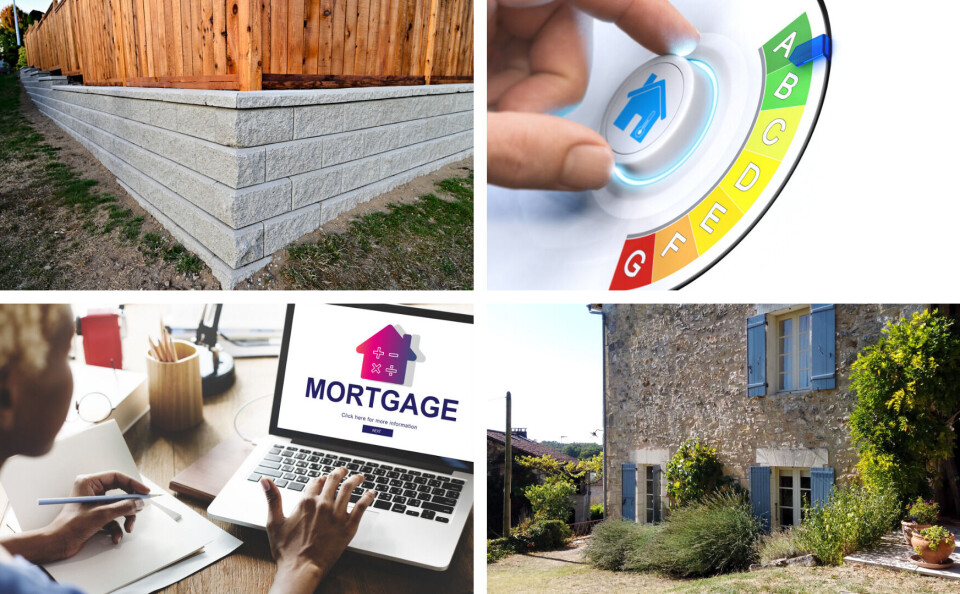-
How long does it take to sell property in different areas of France? New study
Many major cities are showing signs of recovery when it comes to supply, demand, prices, and time to sell
-
Vast majority of French departments opt to increase property notaire fees
What difference will it make to buyers and sellers?
-
Tough Airbnb rules in Marseille prompt many property owners to sell
City council reduce time that a property can be rented to short-term guests
Shared walls, €7,800 house, notaire fees: Five French property updates
We look at a court ruling on who owns walls on the edge of properties, tips to reduce notaire fees and a very low priced house in Brittany that had buyers scrambling to bid

Energy audit obligation delayed for sellers of low-performing properties
This is a reminder of a property update announced at the end of 2021.
Owners of properties that are classed as F or G on the Diagnostic de performance énergétique (DPE) will from September 1 have to get an energy audit of their home before they can sell it.
This measure was initially due to enter into force on January 1 but was pushed back due to unreadiness in the sector.
The DPE uses a graded rating scheme – from A to G – to indicate how energy-efficient a property is, with A the best and G the worst.
It takes into account the energy consumption and greenhouse gas emission rates of a home.
From September, sellers must get an audit that will provide a precise outline of the work needed to renovate the house so that it can achieve a rating of at least B on the DPE.
The audit gives a much more detailed evaluation of a property’s energy efficiency than the DPE.
In addition to assessing what renovation must be carried out, the audit must also provide an estimate of the cost of the work and indicate the public aid available to finance it.
For homeowners, the audit can cost anywhere between €500 and €1,000. It must be carried out by a certified professional - it is recommended to look for those who have the RGE Etudes certification.
It is also possible to get government aid to help finance the cost of ths audit. The amount you receive will depend on your income, but can be up to €500.
You can find out more about this aid through the government website France Rénov’.
You can also read our article explaining France Rénov’ here: What is France Rénov’ aid scheme – can I use it to renovate my house?
This service may also help you to find professionals who are certified to carry out the energy audit. See information here.
Ex-public toilet proves popular with bargain hunters

Bidding on a former public toilet-turned house in a town in Brittany, which was being sold by the local authorities for just €7,800, has been stopped after the property attracted too much interest.
Around 50 bids for the property were put in, while tens of thousands of people viewed the property advert, which you can see here.
Purchase applications stopped being accepted on February 7 due to the high demand.
The property is a 78 square metre brick house in Lannion (Côtes-d’Armor) that requires extensive renovation (see above picture).
The town is now forming a committee to set out criteria upon which a decision will be based to choose the successful bidder. The property may be put back on the market if no candidate is found.
The property was previously owned by the social housing agency Côtes-d’Armor Habitat, which had to give it up due to high costs of renovation and the constraints of the local urban development plan.
Still, the Breton bargain proved extremely popular with people eager to take on the challenge of doing up a cheap building in desperate need of TLC.
Read more:Make sense of local rules governing planning permission around France
Purpose of property boundary wall makes difference to ownership
Supporting walls that are on the boundary of two properties are not necessarily classified as ‘dividing walls’ (mur mitoyen) and are therefore not necessarily jointly owned by both property owners, France’s highest court ruled in a recent verdict to settle a dispute.
The decision came after a couple complained about a neighbour’s wall that encroached on their land.
The neighbour said that as the wall was along the line dividing the properties, it was a ‘dividing wall’ and therefore jointly owned by the couple, and so their responsibility.
But the Cour de cassation ruled that this was not the case, and the wall was actually a supporting wall (mur de soutènement), meaning it had some structural use for the neighbour’s property (shoring up their land), and was therefore owned solely by the neighbour.
The judge said that ‘supporting walls’ can only be claimed to be jointly owned if there is some evidence in favour of that, i.e. that it was built with shared funds or that it has ‘characteristics’ of being a property dividing wall.
Other than ‘supporting walls’, whether in cities or the countryside, all walls serving to divide two properties are considered to be jointly owned by both property owners if there is no legal title or marking to suggest otherwise.
On a property map (plan de cadastre), boundary features such as walls, fences or ditches are often indicated as being on one side of the dividing line, and therefore belonging only to the owner of the property on that side.
New law on mortgages and insurance to be definitively adopted today
A new law that will bring changes to mortgage rules and insurance is set to be definitively adopted today (February 17) in the Senate.
It has already been approved by a mixed parliamentary committee, and this last step is to put the final seal on the law.
It is known as the Loi Lemoine, and will create three main changes. We highlighted this update in last week’s property roundup too, which you can read here.
The changes are:
-
It will become possible to change your mortgage insurance at any time for a better contract. Currently, households can only change their insurance plan or insurer within the first year of taking it out, or, after that, once a year on the date the contract was signed. This will come into force from July 1 for all new insurance contracts, and from September 1 for any existing contracts.
-
The requirement for people to complete a health questionnaire for all mortgages under €200,000 per person (as long as they are taken out before a person’s 60th birthday) is to be scrapped.
-
People who have recovered from cancer in France are, under the proposals, set to soon be able to ‘forget’ about the disease in relation to giving details to insurers, or when applying for mortgages or other loans, after five years of recovery.
Read more:Recovered cancer patients in France set to have easier access to loans
Five tips that could (slightly) reduce notaire fees
If you are buying a property in France, you will need a notaire to help in the transaction.
The fees involved can sometimes be high (note though, that despite the commonly used term ‘notaire fees’, most of the fee is actually taxes that are passed on to the state, and only part remunerates the notaire).
For example, if you are buying a non-new build property, ‘notaire’ fees can around 7-8% of the cost of the house. For a property worth €200,000, that could mean around €15,000 in ‘notaire’ fees.
There are several online calculators to help you work out how much these fees will be when purchasing a property in France, such as this one here.
There are ways to reduce the fees, although not all of them work in every situation.
Below we outline five tips that could help you save some money.
Check cost of items in the house
Notaire fees are calculated on the total price of the empty property.
The equipment that remains in the property, such as a fitted kitchen, bathroom furniture, dressing room furniture, etc., can therefore be deducted from the sale price declared to the tax authorities.
It is usually the real estate agent who estimates the total cost of these features.
However, you can check it to ensure that it is correct and also provide your own estimation. It is not advised to declare a cost that is above 2-3% of the total cost of the house though, as it may mean tax authorities perform an audit.
Notaires are usually vigilant about this estimation, but it could be worth ensuring the estate’s agency’s calculations are accurate.
Deduct estate agency fees (if possible)
It is also possible in certain situations to remove the fees owed to the estate agency from the total price of the property, therefore bringing down the notaire fees. Remember, notaires fees are based on the total cost of the property.
This is only the case if the estate agency fees are being paid by the buyer and not the seller.
For a property worth €200,000, estate agency fees can be as much as €8,000. If those are deducted from what is considered the total cost of the sale, it will bring down the notaire fees by around €500.
Check if your notaire offers a discount
Some notaires offer general discounts on their fees.
A law that came into effect on January 1, 2021, states that they can offer a discount of up to 20% on their earnings for transactions that are equal to or above €100,000.
This discount is optional, and notaires must apply it equally to all of their clients. They are unlikely to offer the full 20% discount.
Buy new builds
Notaires’ fees for new builds are much lower than for non-new builds, at around 2-3%. This means for a property worth €200,000, the fees will come to around €4,000.
However, new builds are also usually much more expensive in general, and buyers also have to pay a 20% VAT to the developers.
On top of this, the market for new builds is much more competitive, so it is not always easy to find the right one.
Check departmental costs
Notaires’ fees vary depending on the department.
Since 2014, departmental councils have been able to increase their levy rate from 3.8% to 4.5% on notaires’ fees.
But several departments in France, such as Indre, Isère, Morbihan, Martinique and Mayotte, have chosen not to do so.
This means that if purchasing a €200,000-home in Isère (without a loan), the notaires’ fees can be around €14,300, compared to €15,700 if buying a similar home in, for example, Hérault.
Related articles
Latest notaire data: Where are property prices rising most in France?
French website makes rental paperwork easier for tenants and landlords
























